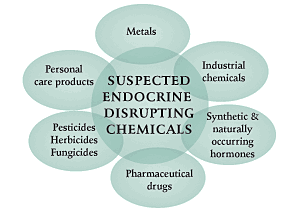This is a subject that I have followed for many years, and I find the trend of puberty happening at younger and younger ages, very disturbing.
There were two stories on this in the last couple of weeks, one on the Sunrise Program (and we know what a balanced view they portray) and another was a more comprehensive article from the Daily Mail in England.
In the Sunrise segment (video below) the nutritionist they interviewed basically said that the lowering of the age of menarche is due to better nutrition over the past 100 years, so we are obviously more healthy and able to become fertile at a younger age. Then he totally contradicts himself by talking about how a recent study found a correlation with young puberty and eating lots of meat – and then advised to reduce meat consumption. So… If puberty before 10 is a “natural” sign of better health and nutrition as he claimed, why in the next breath would he say to avoid the food that contributes to this? I’m just pointing out here, the contradictory and rubbish information that was shared, showing no understanding of the issue at all.
I think we can debate about what has been termed as “better nutrition” over the past 100 years. In that time we have developed the ability to make food very dense in calories and very high in sugar, salt and fat, without expending energy to procure it. We have had a huge rise in artifical foods, chemicals, and pollution and toxins in our environment. If we compare the age of menarche in hunter-gatherer populations who are untouched by the advances of civilisation, and who we could argue, are much “healthier” than the average western societies, their average age of menarche is 16. Which to my mind would appear to be the normal age at which menarche should occur.
Meaning that the age of puberty which has been steadily declining at an rate of 4 months per decade since 1830 (reducing from an average age of 17 to 12) is actually not a normal and healthy decline due to better nutrition. The actual data shows that protein intake has stayed steady for the past 100 years, and that the age of menarche is actually unrelated to the amounts of carbohydrate, protein or fat in our diet or our total energy intake.
The two big changes that have occured over the past 100 years are the type of carbohydrates we consume (refined versus whole), resulting in insulin resistance and hormonal dysfunction; and the chemical toxicity we are exposed to, especially in the form of oestrogen mimicking molecules called xenoestrogens which are found in pesticides, plastics and pollution.
In the Daily Mail article, they at least mention these chemicals as a factor: …”And as scientists have looked for significant changes in the way we live that may account for what is happening, Endocrine Disrupting Chemicals – mostly man-made – are emerging as a prime suspect.
These can damage the way hormones work in our bodies and can mimic the effects of some hormones, including oestrogen. It is a tricky area of research because we are all exposed to a cocktail of these chemicals in our daily lives. One group of chemicals called phthalates are added to plastic to increase its flexibility and can be found in everything from food packaging to toys.
Another, Bisphenol A, is used in some children’s feeding cups and even baby bottles. For his part, Dr Stanhope believes that the early onset of puberty may turn out to have more to do with chemical contamination than diet. ‘It’s just a hunch,’ he told me. ‘There’s no proof as yet, but you only have to look at the way sperm counts have come down in the West in the past 40 years.’…
The article also highlighted the human side to what can be a very traumatic and distressing issue for the children involved. “The problem is that two important life events – puberty, where we develop physically and sexually, and adolescence, where we mature emotionally and psychologically – are now happening separately for many children, whereas they used to coincide.” This causes untold distress for a child who is maturing sexually, yet is not emotionally or mentally ready to deal with it, not to mention the physical changes which can set them apart from their peer group.
It is a subject that every mother needs to be aware of, and find out what they can do to help their daughters remain children for as long as they can. That may mean cleaning up the diet, eating more whole foods and less refined sugars and carbohydrates such as pasta and white rice, and also reducing the amount of toxic chemicals in the home and environment.
Again, this is a subject that Dr Sherrill Sellman will be talking on during her Australian tour in the coming months, and I urge you to come along to find out as much information as you can about this important topic.
Leisa
![]()

No comments yet